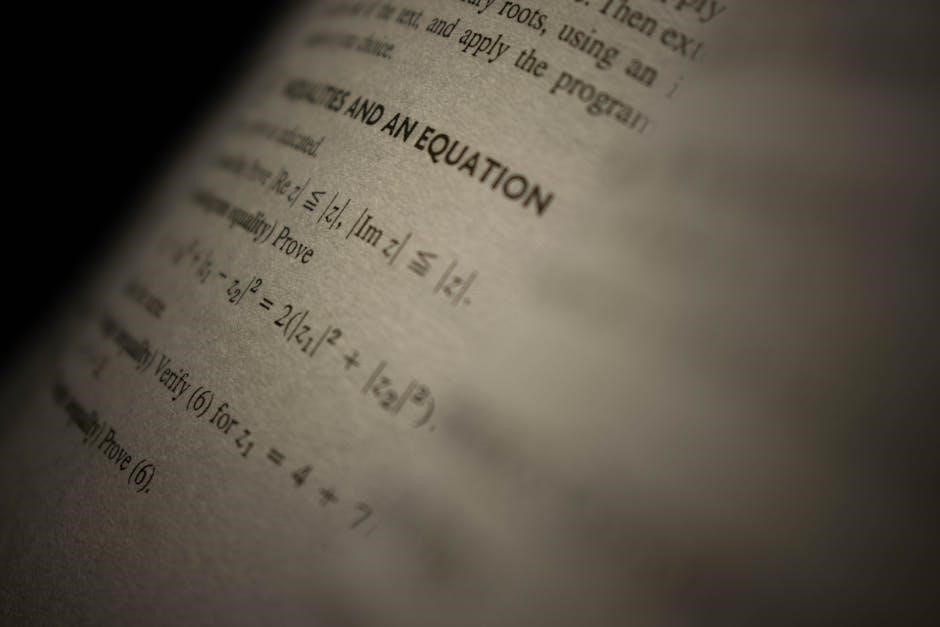Advanced calculus extends basic calculus concepts‚ focusing on theoretical foundations‚ rigorous proofs‚ and advanced techniques for solving complex mathematical problems in science and engineering.
1.1 Definition and Scope of Advanced Calculus
Advanced calculus is a branch of mathematics that extends basic calculus concepts‚ focusing on rigorous proofs‚ abstract theories‚ and complex problem-solving. It explores topics like real numbers‚ sequences‚ series‚ and metric spaces‚ providing a deeper understanding of mathematical analysis. The scope includes multivariable calculus‚ differential forms‚ and applications in physics‚ engineering‚ and data science. This field bridges foundational calculus with advanced mathematical disciplines‚ emphasizing theoretical depth and practical relevance.
1.2 Importance of Advanced Calculus in Mathematics and Science
Advanced calculus is crucial for understanding complex mathematical and scientific concepts‚ providing rigorous tools for analyzing functions‚ sequences‚ and spaces. It forms the foundation for modern mathematical analysis‚ enabling solutions to intricate problems in physics‚ engineering‚ and economics. By introducing multivariable calculus‚ differential equations‚ and real analysis‚ it bridges theoretical mathematics with practical applications‚ equipping researchers and professionals with advanced problem-solving capabilities to tackle real-world challenges effectively.
1.3 Brief History and Evolution of Advanced Calculus
Advanced calculus has its roots in the 17th-century works of Newton and Leibniz‚ evolving over centuries to establish rigorous mathematical frameworks. The 19th century saw foundational contributions from Cauchy and Weierstrass‚ formalizing limits and continuity. In the mid-20th century‚ mathematicians like Lynn Loomis and Shlomo Sternberg developed modern textbooks‚ introducing advanced concepts in multivariable calculus and differential forms. The field continues to expand‚ integrating measure theory and functional analysis‚ as seen in works by authors like Evans and Gariepy‚ ensuring its relevance in contemporary mathematics and science.

Popular Advanced Calculus Books in PDF Format
Advanced Calculus by Frederick S. Woods‚ Advanced Calculus by Robert Wrede‚ and Schaum’s Outline of Advanced Calculus are widely recognized‚ offering detailed theories and practical applications in PDF formats for easy access.
2.1 “Advanced Calculus” by Lynn Loomis and Shlomo Sternberg
Advanced Calculus by Lynn Loomis and Shlomo Sternberg is a highly regarded textbook that provides a rigorous introduction to advanced calculus. Based on an honors course taught at Harvard University‚ this book covers single-variable and multivariable calculus‚ emphasizing theoretical foundations and practical applications. Known for its clear exposition and detailed proofs‚ it has been a trusted resource for students and educators. The PDF version is widely available‚ making it accessible for self-study and academic use. Its comprehensive approach ensures a deep understanding of calculus concepts.
2.2 “Advanced Calculus” by Frederick S. Woods
Advanced Calculus by Frederick S. Woods is a classic textbook that provides an in-depth exploration of calculus topics. First published in the early 20th century‚ this book remains a valuable resource for advanced students. It covers topics such as vector analysis‚ infinite series‚ and special functions‚ with a focus on theoretical rigor and practical applications. The PDF version is available online‚ making it accessible for study. This book is particularly noted for its clarity and detailed explanations‚ making it a favorite among serious learners‚ including the renowned physicist Richard Feynman.
2.3 “Advanced Calculus” by Robert Wrede and Murray R. Spiegel
Advanced Calculus by Robert Wrede and Murray R. Spiegel is a comprehensive textbook designed for advanced students. It covers topics like real numbers‚ sequences‚ series‚ and Euclidean spaces in depth. The book emphasizes rigorous proofs and includes numerous problems and solutions‚ making it ideal for self-study. Published as part of the Schaum’s Outline series‚ it is known for its clear structure and practical approach. The PDF version is widely available online‚ offering a convenient way to access this valuable resource for mastering advanced calculus concepts.
2.4 “Advanced Calculus” by Armin Schikorra
Advanced Calculus by Armin Schikorra is a detailed and organized textbook that covers foundational topics like set theory‚ real numbers‚ sequences‚ and series. It also delves into Euclidean and metric spaces and elements of topology. The book is structured into two parts‚ providing a thorough exploration of advanced calculus concepts. Its clear presentation and rigorous approach make it a valuable resource for students and researchers. The PDF version is accessible online‚ offering a convenient way to study complex mathematical ideas in depth.

Key Features of Advanced Calculus Books
Advanced calculus books offer comprehensive theoretical coverage‚ detailed explanations of principles‚ and rigorous proofs. They also include application-oriented examples and visual aids for better understanding of complex concepts.
3.1 Comprehensive Coverage of Theoretical Concepts
Advanced calculus books provide an in-depth exploration of theoretical concepts‚ ensuring a solid foundation for understanding complex mathematical principles. Topics such as real numbers‚ sequences‚ series‚ and metric spaces are thoroughly explained‚ with rigorous proofs and definitions. These texts also cover topology and uniform continuity‚ essential for advanced analysis. The comprehensive approach ensures that students and researchers can build upon these theories for further mathematical exploration and application.
3.2 Detailed Explanations of Basic Principles
Advanced calculus books provide meticulous explanations of fundamental principles‚ ensuring clarity and accessibility. Concepts such as limits‚ continuity‚ and differentiation are broken down into step-by-step analyses‚ with clear definitions and illustrative examples. This approach helps students grasp the underlying logic and apply these principles to complex problems. The detailed explanations also bridge the gap between theoretical concepts and their practical applications‚ making the material both comprehensive and engaging for learners at all levels.
3.3 Inclusion of Rigorous Proofs and Theorems
Advanced calculus books emphasize the inclusion of rigorous proofs and theorems‚ ensuring a solid understanding of mathematical foundations. Topics like the Mean Value Theorem and Fundamental Theorems of Calculus are thoroughly proven‚ providing logical coherence. These proofs build upon foundational concepts‚ such as continuity and differentiation‚ to establish advanced theories. Theorems are often accompanied by detailed derivations‚ enabling students to appreciate the depth and elegance of calculus. This rigorous approach prepares learners for higher-level mathematics and its applications in various scientific fields.
3.4 Application-Oriented Approach
Advanced calculus books often adopt an application-oriented approach‚ bridging theoretical concepts with real-world problems. Topics like differential equations‚ vector analysis‚ and optimization are explored in the context of physics‚ engineering‚ and economics. Practical examples and case studies illustrate how calculus tools solve complex issues in computer science and biology. This approach ensures learners understand the relevance and versatility of calculus in addressing modern challenges across diverse disciplines.

Foundational Concepts in Advanced Calculus
Advanced calculus builds on core mathematical principles‚ including real numbers‚ sequences‚ series‚ and Euclidean spaces‚ forming the backbone for more complex analysis and applications in higher-level mathematics.
4.1 Real Numbers and Sequences
Real numbers and sequences are fundamental in advanced calculus‚ forming the basis for understanding limits‚ continuity‚ and convergence. The properties of real numbers‚ such as completeness and ordering‚ are crucial for establishing the foundations of analysis. Sequences‚ as functions defined on natural numbers‚ introduce the concept of convergence‚ which extends to series and more complex structures. These ideas are thoroughly explored in advanced calculus textbooks‚ providing a rigorous framework for theoretical and applied mathematics.
4.2 Series and Their Convergence
Series and their convergence are central to advanced calculus‚ enabling the representation of complex functions and solving equations. The convergence of series is analyzed through tests like the comparison‚ ratio‚ and root tests. Taylor and Fourier series are particularly significant‚ providing approximations and decompositions of functions. Understanding series convergence is essential for applications in physics‚ engineering‚ and computer science‚ where infinite series often model real-world phenomena. Advanced calculus textbooks delve into these topics‚ offering rigorous proofs and practical examples to solidify comprehension.
4.3 Euclidean and Metric Spaces
Euclidean and metric spaces form the foundation for understanding advanced calculus concepts. Euclidean spaces represent standard geometric environments with conventional distance metrics‚ while metric spaces generalize these concepts‚ allowing diverse distance definitions. These spaces are crucial in calculus for studying functions‚ continuity‚ and convergence in various dimensions and abstract settings. The study of these spaces enhances the ability to analyze and solve problems in mathematics and science effectively.
4.4 Elements of Topology
Topology‚ a branch of mathematics‚ studies properties of spaces preserved under continuous deformations. In advanced calculus‚ topology provides tools to analyze connectedness‚ compactness‚ and continuity. It introduces concepts like open sets‚ closed sets‚ and topological spaces‚ essential for understanding abstract mathematical structures. These elements are fundamental in higher-level calculus‚ enabling the study of manifolds and metric spaces‚ which are critical in modern analysis and its applications.

Theorems in Advanced Calculus
Advanced calculus encompasses fundamental theorems‚ mean value theorem‚ Taylor and Fourier series‚ and uniform continuity‚ forming the backbone of modern mathematical analysis and applications.
5.1 Fundamental Theorems of Calculus
The fundamental theorems of calculus establish a profound connection between differentiation and integration. They provide a bridge between the instantaneous rate of change and the accumulation of quantities‚ enabling the evaluation of definite integrals through antiderivatives. These theorems are foundational in advanced calculus‚ offering rigorous tools for solving complex problems in mathematics‚ physics‚ and engineering. Their applications extend to optimization‚ physics‚ and data analysis‚ making them indispensable in both theoretical and applied contexts.

5.2 Mean Value Theorem
The Mean Value Theorem (MVT) states that for a function continuous on [a‚ b] and differentiable on (a‚ b)‚ there exists a point c where the derivative equals the average rate of change over [a‚ b]; This theorem is crucial in calculus‚ providing insights into a function’s behavior‚ such as confirming local maxima or minima. It is widely used in advanced calculus to establish properties of functions and is a key tool in analysis and optimization problems across various scientific fields.
5.3 Taylor and Fourier Series
Taylor series expand functions into infinite polynomials‚ enabling approximations and analysis of function behavior. Fourier series represent periodic functions as sums of sines and cosines‚ crucial in physics and engineering. Both are foundational in advanced calculus‚ allowing the study of function properties like convergence and periodicity. These series are essential tools for solving differential equations and understanding wave phenomena. Their applications span signal processing‚ heat transfer‚ and quantum mechanics‚ making them indispensable in modern scientific and engineering disciplines.
5.4 Uniform Continuity and Connected Sets
Uniform continuity strengthens the concept of continuity by ensuring a function’s behavior is consistent across its entire domain. Connected sets‚ such as intervals in real numbers‚ are essential for preserving properties like the Intermediate Value Theorem. These concepts are vital in advanced calculus for understanding function behavior in metric spaces and ensuring the validity of theorems like the Mean Value Theorem. They form the backbone of rigorous analysis‚ enabling deeper insights into the structure of mathematical spaces and their applications in physics and engineering.
Applications of Advanced Calculus
Advanced calculus plays a pivotal role in modern science‚ engineering‚ economics‚ and computer science‚ enabling the analysis of complex systems‚ optimization‚ and data modeling across diverse disciplines.
6.1 Physics and Engineering Applications
Advanced calculus is foundational in physics and engineering‚ providing tools for solving complex problems in quantum mechanics‚ fluid dynamics‚ and electromagnetism. It enables the analysis of vector fields‚ differential equations‚ and optimization in design. Engineers use multivariable calculus for stress analysis and thermodynamics‚ while physicists rely on it for wave equations and relativity. Books like Loomis and Sternberg’s Advanced Calculus offer detailed explanations of these applications‚ bridging theory and practical implementation in scientific and technical fields.
6.2 Economics and Optimization
Advanced calculus plays a critical role in economics‚ particularly in optimization and equilibrium analysis. Techniques like differentiation and Lagrange multipliers are used to maximize utility‚ profit‚ and welfare. Economic models often rely on calculus to analyze supply-demand dynamics and resource allocation. Books such as Advanced Calculus by Loomis and Sternberg provide foundational tools for solving economic optimization problems‚ making them essential resources for economists and policymakers seeking to model and predict market behaviors effectively.
6.3 Computer Science and Data Analysis
Advanced calculus is integral to computer science and data analysis‚ enabling the development of algorithms and machine learning models. Techniques like differentiation and integration are used in optimization algorithms‚ such as gradient descent‚ to minimize errors in predictions. Books such as Advanced Calculus by Armin Schikorra provide foundational tools for understanding these mathematical underpinnings‚ which are crucial for tasks like data modeling‚ signal processing‚ and neural network design. This mathematical rigor ensures professionals can tackle complex computational challenges effectively.
6.4 Biology and Medicine
Advanced calculus plays a vital role in biology and medicine‚ particularly in modeling complex biological systems and understanding rates of change. Concepts like differential equations are used to study population dynamics‚ disease spread‚ and pharmacokinetics. Calculus aids in medical imaging techniques and optimizing drug delivery systems. Books such as Advanced Calculus provide mathematical tools essential for analyzing biological data and developing predictive models‚ enabling researchers to address critical challenges in healthcare and biomedical sciences effectively.

Tools and Resources for Learning Advanced Calculus
Utilize online platforms like Khan Academy‚ calculus-specific software‚ and interactive tools for visualizing complex concepts. PDF books and study guides provide structured learning paths and practice problems.
7.1 Online Lectures and Tutorials
Online lectures and tutorials provide flexible learning opportunities for mastering advanced calculus. Platforms like Khan Academy‚ Coursera‚ and MIT OpenCourseWare offer comprehensive video explanations and problem-solving guides. These resources often include interactive exercises and quizzes to reinforce concepts. Additionally‚ YouTube channels such as 3Blue1Brown present complex ideas through engaging animations. Many websites also offer downloadable PDF notes and study materials‚ making it easier to follow along with lectures. These tools are particularly useful for self-learners and those seeking supplementary resources to complement their advanced calculus books.
7.2 Software for Calculus Problems
Software tools like Mathematica‚ Study guides and workbooks for advanced calculus provide comprehensive practice problems‚ detailed solutions‚ and concept summaries‚ helping students master complex topics. These resources often complement PDF textbooks‚ offering step-by-step explanations and examples to reinforce understanding. Many guides focus on problem-solving techniques‚ enabling learners to apply theoretical knowledge to real-world scenarios. Additionally‚ workbooks include exercises tailored to specific chapters or themes‚ making them invaluable for self-study and exam preparation. They are a practical tool for enhancing proficiency in advanced calculus. Online forums and communities provide valuable platforms for discussing advanced calculus topics‚ sharing resources‚ and solving problems collaboratively. Websites like Math Stack Exchange and Reddit’s r/learnmath offer spaces for students to ask questions‚ receive feedback‚ and engage with experts. These communities often share PDF books‚ study guides‚ and lecture notes‚ making them a rich resource for learners. Participating in these forums fosters a sense of collaboration and mutual support‚ helping students overcome challenges in their studies of advanced calculus. A structured approach involves mastering theoretical concepts‚ applying them to practical problems‚ and utilizing resources like comprehensive textbooks and online materials for deeper understanding. Mastering basic calculus concepts is essential for advancing to higher-level topics. Start with limits‚ derivatives‚ and integrals‚ ensuring a deep understanding of their definitions and applications. Focus on rigorous proofs and theoretical underpinnings‚ as these form the backbone of advanced calculus. Utilize textbooks like “Advanced Calculus” by Loomis and Sternberg‚ which provide comprehensive coverage of foundational principles. Practice problem-solving to reinforce concepts‚ and explore the connection between calculus and its applications in science and engineering. Regular practice is crucial for mastering advanced calculus. Engage with diverse problem sets that challenge your understanding of theoretical concepts. Utilize textbooks like “Advanced Calculus” by Loomis and Sternberg‚ which offer comprehensive exercises and detailed solutions. Focus on understanding the logical flow of proofs and applying them to practical scenarios. This approach strengthens your ability to connect abstract theory with real-world applications‚ preparing you for the demands of higher-level mathematics. Engaging with modern mathematical concepts in advanced calculus involves exploring measure theory‚ functional analysis‚ and differential forms. These topics‚ often introduced in texts like Advanced Calculus by Armin Schikorra‚ provide a foundational understanding of contemporary mathematical frameworks. By studying these concepts‚ students gain insight into the interconnections between calculus and other fields‚ such as topology and linear algebra. This modern approach not only enriches problem-solving skills but also prepares learners for advanced research and applications in data science and engineering. Visual aids and graphs are essential for understanding complex concepts in advanced calculus. Textbooks often include illustrations of functions‚ sequences‚ and spaces to help students visualize abstract ideas. For instance‚ 3D graphs can simplify the analysis of multivariable functions‚ while convergence tests are often depicted graphically. These tools not only enhance comprehension but also make problem-solving more intuitive. Modern resources‚ such as PDFs of advanced calculus books‚ frequently incorporate color-coded diagrams and interactive simulations to engage learners and deepen their grasp of theoretical concepts. Advanced calculus is a cornerstone of mathematical analysis‚ offering deep insights into theoretical and practical applications. For further exploration‚ texts like Lynn Loomis’s and Armin Schikorra’s works provide comprehensive resources in PDF formats‚ ideal for advanced learners seeking to master calculus. Advanced calculus delves into theoretical foundations‚ including real numbers‚ sequences‚ and metric spaces. It emphasizes rigorous proofs and theorems‚ such as the Fundamental Theorem of Calculus and Mean Value Theorem. Topics like uniform continuity and connected sets are explored in depth. Applications in physics and engineering highlight its practical relevance. Resources like Lynn Loomis’s and Armin Schikorra’s PDF books provide comprehensive guides for advanced learners. For deeper exploration‚ delve into differential forms and Lebesgue integration. Explore Hilbert spaces and Fourier analysis for advanced applications. Consider studying functional analysis and measure theory for a broader understanding. Utilize resources like Lynn Loomis’s and Armin Schikorra’s PDF books for comprehensive insights. Engage with online tutorials and forums like Math Stack Exchange to clarify complex concepts. Supplement learning with courses from Coursera or edX for a well-rounded education in advanced calculus. Advanced calculus is a cornerstone of modern mathematics‚ offering deep insights into theoretical foundations and practical applications across science and engineering. Its rigorous approach to proofs and concepts equips scholars with tools to tackle complex problems. The availability of PDF resources like Loomis and Sternberg’s “Advanced Calculus” ensures accessibility for learners worldwide. Mastery of this field not only enhances analytical skills but also fosters innovation and critical thinking‚ making it indispensable for advancing mathematical and scientific knowledge.7.3 Study Guides and Workbooks
7.4 Forums and Communities

Learning Approach for Advanced Calculus
8.1 Building a Strong Foundation in Basic Calculus
8.2 Practicing Rigorous Problem Solving
8.3 Engaging with Modern Mathematical Concepts
8.4 Utilizing Visual Aids and Graphs
9.1 Summary of Key Concepts
9.2 Recommendations for Further Study
9.3 Final Thoughts on the Importance of Advanced Calculus
